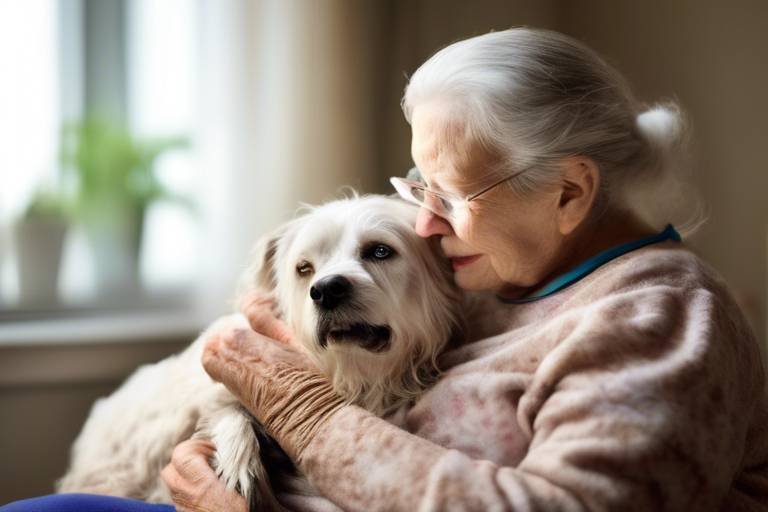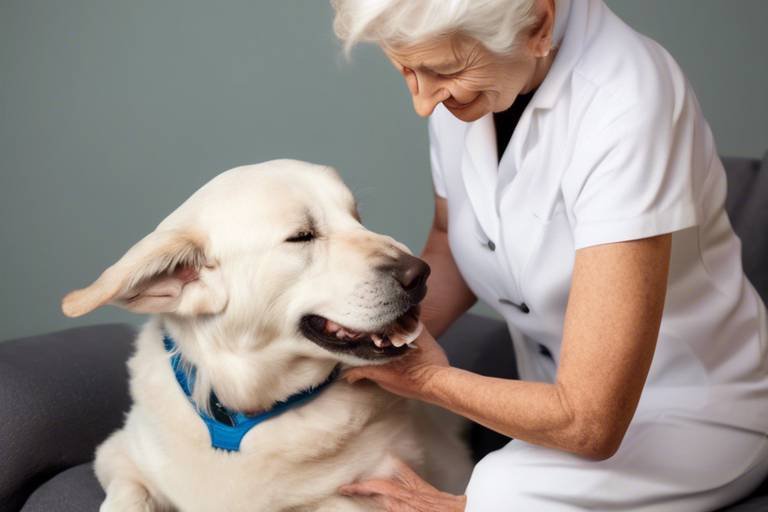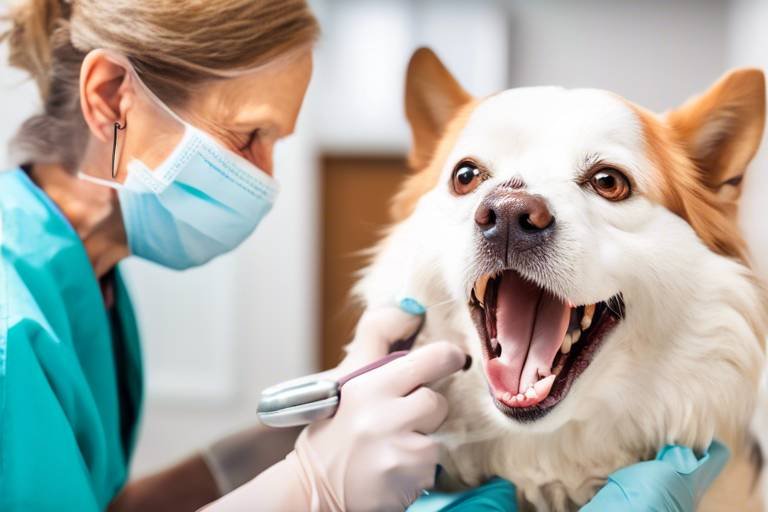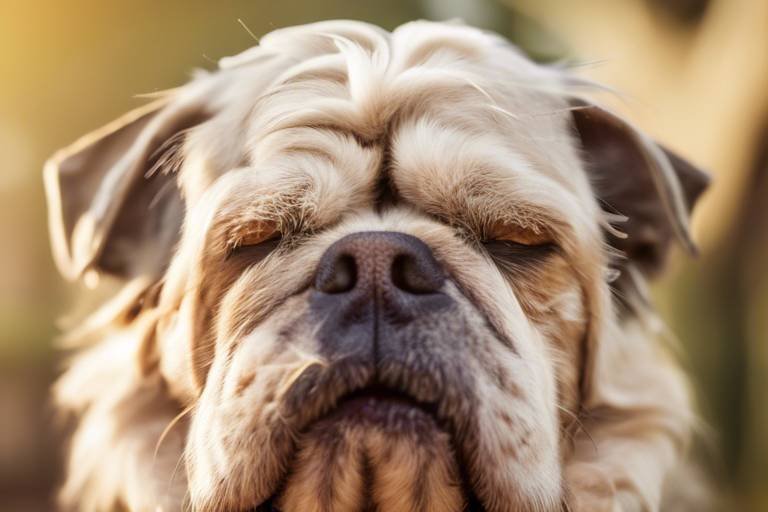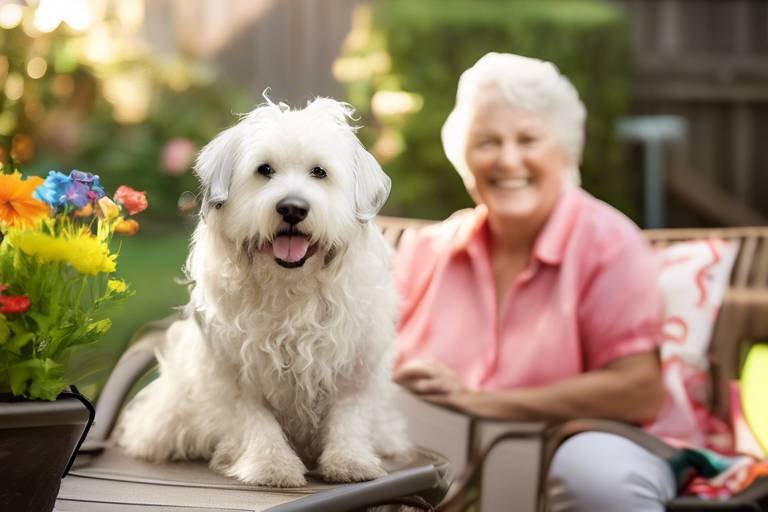Managing a Senior Pet’s Behavioral Changes
As our furry friends grow older, it's not just their physical appearance that changes; their behavior can shift dramatically as well. Just like us, pets experience the effects of aging, leading to a variety of behavioral changes that can sometimes be puzzling for their owners. This article delves into the common behavioral modifications seen in senior pets and provides practical strategies to help pet owners navigate these changes effectively. By understanding and addressing these shifts, you can ensure that your beloved companion remains happy and healthy in their golden years.
Aging affects pets in numerous ways, leading to both physical and mental changes. For instance, you might notice that your once-vibrant dog is now more hesitant to jump onto the couch or that your cat seems to prefer lounging in the sun instead of chasing after toys. Recognizing these changes is crucial for pet owners to adapt their care strategies accordingly. Just like how we might need reading glasses or a comfy chair as we age, our pets may also require adjustments in their daily routines and environments to cater to their evolving needs.
As pets age, they may exhibit a range of behavioral changes. Some of the most common include:
- Increased Anxiety: Many senior pets experience heightened anxiety, which can stem from health changes or shifts in their environment.
- Decreased Activity: You might find that your pet is less enthusiastic about their usual playtime or walks.
- Altered Sleeping Patterns: Senior pets often sleep more but may also experience disrupted sleep due to discomfort or anxiety.
Understanding these behaviors helps owners respond appropriately to their pets' needs. For example, if your pet seems more anxious, it might be time to evaluate their surroundings and consider creating a more comforting atmosphere.
Many senior pets experience heightened anxiety due to changes in their environment or health. This anxiety can manifest in various ways, such as increased barking, hiding, or even destructive behaviors. Identifying triggers—such as loud noises, unfamiliar visitors, or changes in routine—can be pivotal in managing your pet's anxiety levels. Creating a safe space for your pet, complete with their favorite blanket or toys, can help them feel more secure.
Recognizing signs of anxiety is essential. If your pet is excessively barking, pacing, or hiding, these may be indications that they are feeling stressed. Additionally, changes in eating habits or grooming behaviors can also signal anxiety. By paying close attention to these signs, you can take proactive steps to alleviate your pet’s stress and improve their overall quality of life.
Implementing effective strategies can significantly reduce anxiety levels in senior pets. Here are some proven methods:
- Consistent Routine: Establishing a daily routine can provide your pet with a sense of security.
- Calming Products: Consider using calming collars, pheromone diffusers, or anxiety wraps that can help soothe your pet.
- Behavior Modification Techniques: Training and positive reinforcement can help modify anxious behaviors over time.
By enhancing your pet's comfort and happiness, you can create a nurturing environment that supports their emotional well-being.
As pets age, they often become less active. This decrease in activity can lead to weight gain and other health issues, making it essential for owners to encourage gentle exercise. Simple activities like short walks, interactive play, or even gentle stretching can help maintain their physical health and mental stimulation. Think of it as a leisurely stroll through the park—it's not about speed, but rather enjoying the journey together.
Diet plays a vital role in managing behavioral changes in senior pets. As their metabolism slows down, adjusting their nutrition can positively impact their overall mood and energy levels. A well-balanced diet tailored to a senior pet’s needs can help manage weight and health issues, directly influencing their behavior and energy. It’s like giving them a gourmet meal that not only satisfies their hunger but also nourishes their body.
A balanced diet is crucial for senior pets. It should include high-quality protein, healthy fats, and essential vitamins and minerals. Foods rich in antioxidants can also help combat the effects of aging. By focusing on their nutritional needs, you can significantly improve their quality of life and behavioral responses.
Certain supplements, such as omega fatty acids or joint support vitamins, can aid in improving the mood and mobility of senior pets. These supplements can contribute to better overall behavior and help alleviate discomfort associated with aging. Always consult your veterinarian before introducing new supplements to ensure they are appropriate for your pet's specific health needs.
Q: How can I tell if my senior pet is in pain?
A: Look for signs such as limping, reluctance to move, changes in appetite, or unusual vocalizations. If you notice any of these signs, consult your veterinarian.
Q: Is it normal for my senior pet to sleep more?
A: Yes, it's common for older pets to sleep more. However, if there are sudden changes in their sleeping patterns, it's best to consult a veterinarian.
Q: What can I do to help my anxious pet?
A: Establishing a consistent routine, providing a safe space, and using calming products can help reduce anxiety in senior pets.
Q: Should I change my senior pet's diet?
A: Yes, as pets age, their dietary needs change. Consult your veterinarian for recommendations on the best diet for your senior pet.

Understanding Aging in Pets
This article explores the common behavioral changes that occur in senior pets and offers strategies for pet owners to help manage these changes effectively, ensuring the well-being of their beloved companions.
Aging affects pets in various ways, leading to physical and mental changes. Just like humans, pets experience a variety of transformations as they grow older. These changes can be as subtle as a slight decrease in energy or as pronounced as significant alterations in behavior. Recognizing these changes is crucial for pet owners to adapt their care strategies accordingly. For instance, a once playful puppy may now prefer lounging on the couch, and this shift can be perplexing for pet owners who may not understand the underlying causes.
As pets age, their bodies undergo numerous changes. The most common physical changes include:
- Decreased Mobility: Arthritis or joint issues can make movement painful, leading to a more sedentary lifestyle.
- Vision and Hearing Loss: Deteriorating senses can cause confusion and anxiety, as pets may struggle to navigate their environment.
- Weight Changes: Senior pets may either gain or lose weight due to changes in metabolism and activity levels.
Alongside these physical changes, mental health is also impacted. Cognitive dysfunction syndrome (CDS) is a common issue in older pets, akin to dementia in humans. Pets may exhibit signs of disorientation, disrupted sleep patterns, and altered social interactions. It's essential for pet owners to be observant and compassionate, understanding that these changes are not merely behavioral but are often rooted in genuine discomfort or confusion.
Moreover, the emotional landscape of an aging pet can shift dramatically. They may become more anxious or fearful, particularly in response to changes in their environment or routine. For example, a senior dog that once thrived on social interactions may suddenly shy away from visitors or new experiences. Recognizing these emotional shifts is vital for maintaining a harmonious home environment.
Understanding the aging process in pets also means acknowledging the importance of regular veterinary check-ups. These visits can help detect health issues early, allowing for timely intervention. Regular assessments can also provide insights into behavioral changes, helping owners to tailor their care more effectively. It's not just about treating symptoms; it's about enhancing the overall quality of life for senior pets.
In summary, aging in pets is a multifaceted process that affects their physical health, mental well-being, and emotional stability. By being aware of these changes and taking proactive steps, pet owners can ensure that their beloved companions continue to live happy and fulfilling lives, even in their golden years.
Senior pets may exhibit changes such as increased anxiety, decreased activity, or altered sleeping patterns. Understanding these behaviors helps owners respond appropriately to their pets' needs.
Many senior pets experience heightened anxiety due to changes in their environment or health. Identifying triggers can help owners create a more comforting atmosphere for their pets.
Recognizing signs of anxiety, such as excessive barking or hiding, allows owners to take proactive steps in alleviating their pet’s stress and improving their overall quality of life.
Implementing strategies like a consistent routine, calming products, or behavior modification techniques can significantly reduce anxiety levels in senior pets, enhancing their comfort and happiness.
As pets age, they often become less active. Understanding how to encourage gentle exercise can help maintain their physical health and mental stimulation.
Diet plays a vital role in managing behavioral changes in senior pets. Adjusting their nutrition can positively impact their overall mood and energy levels.
A well-balanced diet tailored to a senior pet’s needs can help manage weight and health issues, directly influencing their behavior and energy.
Certain supplements, such as omega fatty acids or joint support vitamins, can aid in improving the mood and mobility of senior pets, contributing to better overall behavior.
Q: How can I tell if my pet is experiencing cognitive dysfunction?
A: Look for signs such as disorientation, changes in sleep patterns, and altered social behavior. If you notice these symptoms, consult your veterinarian.
Q: What are some signs that my senior pet is in pain?
A: Signs can include limping, reluctance to move, changes in appetite, or excessive vocalization. Always consult a vet if you suspect pain.
Q: How often should I take my senior pet to the vet?
A: It's generally recommended to have senior pets checked at least twice a year for early detection of health issues.

Common Behavioral Changes
As our furry companions gracefully age, they often undergo a variety of behavioral changes that can be both surprising and challenging for pet owners. Just like humans, pets experience shifts in their mood, energy levels, and overall demeanor as they navigate through their golden years. It’s essential for pet owners to recognize these changes not only to ensure their pets' comfort but also to enhance their quality of life.
One of the most noticeable changes is an increase in anxiety or stress levels. Senior pets might find themselves feeling more anxious due to various factors such as health issues, changes in their environment, or even the loss of a companion. For instance, a once-confident dog may suddenly become skittish during thunderstorms or in crowded places. This heightened anxiety can manifest in several ways, including excessive barking, pacing, or even hiding. Being aware of these signs is the first step toward creating a more supportive environment for your pet.
Another common behavioral change is a decrease in activity levels. As pets age, they may become less inclined to engage in play or exercise, which can lead to weight gain and further health complications. Imagine a lively puppy that once darted around the yard now opting for a cozy nap instead. This shift can be concerning, but it’s important to understand that a decrease in activity is often a natural part of aging. Encouraging gentle exercise, such as short walks or light play sessions, can help maintain their physical health while also providing mental stimulation.
Additionally, many senior pets experience altered sleeping patterns. You might notice your once-regular sleeper now waking up multiple times during the night or napping more frequently during the day. This change can be attributed to discomfort from arthritis or other health issues, and it’s crucial for owners to be attentive to their pets’ needs. Creating a comfortable sleeping area with supportive bedding can significantly improve their sleep quality.
To summarize, the common behavioral changes in senior pets can include:
- Increased anxiety and stress
- Decreased activity levels
- Altered sleeping patterns
Recognizing these changes early on allows pet owners to take proactive measures to support their beloved companions. Whether it’s through creating a calming environment, encouraging gentle exercise, or ensuring they have a comfortable resting space, understanding the nuances of your senior pet’s behavior can lead to a happier and healthier life for both of you.
Q: How can I tell if my senior pet is anxious?
A: Look for signs such as excessive barking, hiding, pacing, or changes in appetite. If you notice any of these behaviors, it may indicate that your pet is feeling anxious.
Q: Should I change my senior pet's diet?
A: Yes, adjusting your senior pet's diet to meet their specific nutritional needs is crucial. A well-balanced diet can help manage weight and health issues, which can positively influence their behavior.
Q: What kind of exercise is suitable for senior pets?
A: Gentle exercises like short walks, light play, or even swimming can be beneficial. Always consult your veterinarian to determine the best exercise plan for your pet's health condition.
Increased Anxiety and Stress
As our furry companions age, it's not uncommon for them to experience . This can stem from a variety of factors, including changes in their environment, health issues, or even the loss of a companion. Just like humans, pets can become more sensitive to their surroundings as they grow older, making it essential for pet owners to be vigilant and responsive to these changes. Imagine a once-vibrant dog who now seems to jump at every little noise; this heightened sensitivity can be a clear indicator that your pet is feeling anxious.
Recognizing the signs of anxiety is the first step toward helping our senior pets feel more secure. Common signs include excessive barking, destructive behavior, pacing, or even hiding away in a corner. These behaviors can be distressing to observe, but they also provide us with clues about what our pets are experiencing. By identifying specific triggers—such as loud noises, changes in routine, or unfamiliar visitors—owners can begin to create a more comforting atmosphere. For instance, if your pet becomes anxious during thunderstorms, providing a safe space equipped with their favorite blanket and toys can help them feel more at ease.
Moreover, a consistent daily routine can work wonders for anxious pets. Animals thrive on predictability, and knowing what to expect can significantly reduce their stress levels. Regular feeding times, walks, and play sessions can create a sense of stability that reassures your pet. Additionally, consider incorporating calming products into their environment, such as pheromone diffusers or anxiety wraps, which can provide a sense of security and comfort.
In some cases, behavioral modification techniques may also be beneficial. Techniques such as positive reinforcement can help reshape anxious behaviors over time. For example, rewarding your pet for calm behavior during a stressful event can reinforce their ability to cope. Remember, patience is key; it may take time for your pet to adjust and feel more secure in their surroundings.
Ultimately, the goal is to create a peaceful environment where your senior pet can thrive despite their anxiety. By being proactive and attentive, you can help your beloved companion navigate this challenging stage of life with grace and comfort.
Signs of Anxiety
Recognizing the signs of anxiety in senior pets is crucial for ensuring their comfort and well-being. Just like humans, our furry friends can experience stress and anxiety, and these feelings can manifest in various ways. For instance, you might notice your pet becoming more vocal, exhibiting excessive barking, or even meowing more than usual. This increase in vocalization can be their way of expressing discomfort or unease, almost like they're trying to tell you something isn't right.
Another common sign is a change in behavior when it comes to their usual routines. If your once-friendly dog suddenly starts hiding under the bed or in a corner, it could be a clear indication that they are feeling anxious. This retreat can be their way of seeking a safe space where they feel less vulnerable. Additionally, you might observe changes in their eating habits; a senior pet that used to gobble up their meals might start to pick at their food or refuse to eat altogether. This could be a direct response to their anxiety levels.
Physical signs are also telling. Look out for symptoms such as:
- Pacing or restlessness
- Excessive grooming or licking
- Trembling or shaking
- Changes in sleeping patterns, like insomnia or excessive sleeping
It's important to remember that these signs can vary from pet to pet, depending on their personality and previous experiences. Some might show their anxiety through destructive behaviors, like chewing on furniture or digging at carpets, while others may become more withdrawn and quiet. The key is to be observant and sensitive to these changes, as they can significantly impact your pet's quality of life.
By understanding these signs, you can take proactive measures to alleviate your senior pet's anxiety. Creating a calm environment, maintaining a consistent routine, and providing comfort can make a world of difference. Remember, your pet relies on you to recognize their needs and help them navigate through this challenging stage of life.
Q: What should I do if I notice signs of anxiety in my senior pet?
A: If you observe signs of anxiety, consult your veterinarian for advice. They can help determine if there are underlying health issues and provide strategies to manage your pet's anxiety effectively.
Q: Are there specific calming products for senior pets?
A: Yes, there are various calming products available, including anxiety wraps, pheromone diffusers, and calming treats. These can help create a more soothing environment for your pet.
Q: Can diet affect my senior pet's anxiety levels?
A: Absolutely! A balanced diet can significantly impact your pet's mood and energy levels. Consult your vet for dietary recommendations tailored to your pet's needs.
Q: How can I tell if my pet's anxiety is severe?
A: If your pet's anxiety leads to destructive behavior, extreme withdrawal, or if they are not eating or drinking, it's essential to seek professional help from a veterinarian or a pet behaviorist.
Strategies for Reducing Anxiety
This article explores the common behavioral changes that occur in senior pets and offers strategies for pet owners to help manage these changes effectively, ensuring the well-being of their beloved companions.
Aging affects pets in various ways, leading to physical and mental changes. Recognizing these changes is crucial for pet owners to adapt their care strategies accordingly.
Senior pets may exhibit changes such as increased anxiety, decreased activity, or altered sleeping patterns. Understanding these behaviors helps owners respond appropriately to their pets' needs.
Many senior pets experience heightened anxiety due to changes in their environment or health. Identifying triggers can help owners create a more comforting atmosphere for their pets.
Recognizing signs of anxiety, such as excessive barking or hiding, allows owners to take proactive steps in alleviating their pet’s stress and improving their overall quality of life.
Managing a senior pet's anxiety can be a delicate balancing act, but with the right strategies, you can create a more peaceful environment for your furry friend. One of the most effective approaches is establishing a consistent daily routine. Just like humans, pets thrive on predictability. When they know what to expect, it can significantly reduce their stress levels. For instance, try feeding, walking, and playtime at the same times every day. This not only helps your pet feel secure but also strengthens your bond.
Additionally, consider incorporating calming products into your pet's life. There are various options available, such as anxiety wraps, which provide gentle pressure that can soothe anxious pets, or pheromone diffusers that mimic natural calming scents. These products work wonders for many pets, creating a serene atmosphere that helps ease their worries.
Moreover, engaging in behavior modification techniques can be beneficial. Training your pet to associate certain situations with positive experiences can alleviate anxiety. For example, if your pet feels anxious during thunderstorms, try desensitization techniques by gradually exposing them to the sound of thunder while rewarding them with treats and praise. Over time, they may learn to associate the noise with positive experiences rather than fear.
Lastly, don't underestimate the power of gentle exercise. Regular, light physical activity can help reduce anxiety levels by releasing endorphins. A leisurely stroll around the block or a gentle game of fetch can do wonders for your pet's mental health. Just be sure to tailor the activity to your pet’s energy levels and physical capabilities.
Diet plays a vital role in managing behavioral changes in senior pets. Adjusting their nutrition can positively impact their overall mood and energy levels.
A well-balanced diet tailored to a senior pet’s needs can help manage weight and health issues, directly influencing their behavior and energy.
Certain supplements, such as omega fatty acids or joint support vitamins, can aid in improving the mood and mobility of senior pets, contributing to better overall behavior.
- What are the signs that my senior pet is experiencing anxiety?
Look for behaviors such as excessive barking, hiding, pacing, or changes in eating habits. These can be indicators of anxiety in pets. - How can I help my senior pet feel more comfortable during thunderstorms?
Utilize calming products like anxiety wraps or pheromone diffusers, and consider training techniques to desensitize them to the sound of thunder. - Is it safe to use supplements for my senior pet?
Yes, but it’s essential to consult your veterinarian before introducing any supplements to ensure they are appropriate for your pet’s specific health needs.
Changes in Activity Levels
As our furry friends age, it’s not just their gray whiskers that tell the story; their activity levels often shift dramatically as well. You might notice that your once energetic pup now prefers lounging on the couch rather than chasing after that elusive squirrel in the yard. This decrease in activity can be attributed to several factors, including arthritis, decreased energy levels, or even cognitive decline. It’s essential to recognize these changes because they can significantly impact your pet’s physical health and overall happiness.
Understanding how to encourage gentle exercise is crucial for maintaining your senior pet's physical health and mental stimulation. Think of it like giving them a gentle nudge to get off the couch and enjoy the world outside. You don't want to push them too hard, but a little encouragement can go a long way. For instance, short walks around the block or interactive play sessions with soft toys can be a great way to keep them engaged without overexerting them.
Here are a few tips to help manage your senior pet’s activity levels:
- Short and Sweet Walks: Instead of long hikes, opt for shorter, more frequent walks. This keeps their joints moving without exhausting them.
- Interactive Toys: Invest in toys that stimulate their mind and encourage light physical activity. Puzzle toys can keep them entertained and mentally sharp.
- Playdates: Arrange playdates with other calm pets. Social interaction can motivate your senior pet to be more active.
Another important aspect to consider is their environment. Make sure that your home is pet-friendly, with easy access to their favorite spots. If your pet struggles to navigate stairs or slippery floors, consider adding ramps or non-slip mats. This can help them feel more secure and willing to move around.
Lastly, always consult with your veterinarian before making any significant changes to your pet's exercise routine. They can provide tailored advice based on your pet’s specific health needs. Remember, every little bit of movement counts, and with a little creativity, you can help your senior pet stay active and healthy well into their golden years.
Q: How can I tell if my senior pet is in pain during activity?
A: Look for signs such as limping, reluctance to move, or vocalizing when getting up or lying down. If you notice any of these signs, consult your veterinarian.
Q: What types of exercises are best for senior pets?
A: Gentle exercises like short walks, swimming, or playing with soft toys are ideal. Always tailor the activity to your pet's physical capabilities.
Q: How do I know if my pet is getting enough exercise?
A: Monitor their weight, energy levels, and overall mood. If they seem lethargic or are gaining weight, it may be time to adjust their activity levels.
Q: Can diet affect my senior pet's energy levels?
A: Absolutely! A balanced diet tailored to their age and health needs can significantly influence their energy and overall behavior.

Nutrition and Senior Pets
Nourishing our senior pets is akin to providing a warm blanket on a chilly day; it envelops them in comfort and security. As our furry companions age, their nutritional needs evolve, making it essential for pet owners to adapt their feeding strategies. A well-balanced diet is not just about filling their bowls; it's about enhancing their quality of life and supporting their health. Just like humans, pets require different nutrients as they grow older, and understanding these needs can make a significant difference in their overall well-being.
One of the first steps in managing a senior pet's nutrition is to recognize that their metabolism slows down. This means that they may not require as many calories as they did in their younger years. However, this doesn't mean skimping on the vital nutrients they need. A diet rich in high-quality proteins, fiber, and essential vitamins and minerals is crucial. For instance, incorporating lean meats, fish, and vegetables can provide the necessary nutrients without excessive calories.
Moreover, hydration plays a critical role in the diet of senior pets. Older pets can be prone to dehydration, which can lead to various health issues. Ensuring they have access to fresh water at all times is fundamental. Some pet owners even find that adding wet food to their senior pet's diet can increase their water intake while also providing additional nutrients.
To illustrate the importance of a balanced diet for senior pets, consider the following table that outlines key nutrients and their benefits:
| Nutrient | Benefits |
|---|---|
| High-Quality Protein | Supports muscle maintenance and overall energy levels. |
| Omega Fatty Acids | Promotes healthy skin, coat, and joint function. |
| Antioxidants | Helps combat free radicals and supports immune function. |
| Fiber | Aids in digestion and helps maintain a healthy weight. |
In addition to adjusting their diet, some pet owners may consider incorporating supplements into their senior pet's regimen. Supplements like omega fatty acids can boost their mood and mobility, while joint support vitamins can alleviate discomfort associated with aging joints. However, it’s always best to consult with a veterinarian before introducing any new supplements to ensure they’re appropriate for your pet’s specific needs.
Ultimately, the goal of tailoring nutrition for senior pets is to keep them feeling their best. Just as we would want to feel vibrant and energetic in our golden years, our pets deserve the same. By being mindful of their dietary needs and making thoughtful adjustments, we can help our beloved companions thrive during their senior years.
- What should I feed my senior pet? A balanced diet that includes high-quality protein, fiber, and essential vitamins is crucial. Consult your vet for specific recommendations based on your pet's needs.
- How often should I feed my senior pet? Most senior pets benefit from smaller, more frequent meals rather than one or two large meals a day.
- Are supplements necessary for senior pets? While not always necessary, certain supplements can support joint health and overall well-being. Always consult your veterinarian before adding supplements.
- How can I tell if my pet is overweight? You should be able to feel your pet's ribs without excess fat covering. If you're unsure, a vet visit can help assess your pet's weight and health.
Importance of a Balanced Diet
This article explores the common behavioral changes that occur in senior pets and offers strategies for pet owners to help manage these changes effectively, ensuring the well-being of their beloved companions.
Aging affects pets in various ways, leading to physical and mental changes. Recognizing these changes is crucial for pet owners to adapt their care strategies accordingly.
Senior pets may exhibit changes such as increased anxiety, decreased activity, or altered sleeping patterns. Understanding these behaviors helps owners respond appropriately to their pets' needs.
Many senior pets experience heightened anxiety due to changes in their environment or health. Identifying triggers can help owners create a more comforting atmosphere for their pets.
Recognizing signs of anxiety, such as excessive barking or hiding, allows owners to take proactive steps in alleviating their pet’s stress and improving their overall quality of life.
Implementing strategies like a consistent routine, calming products, or behavior modification techniques can significantly reduce anxiety levels in senior pets, enhancing their comfort and happiness.
As pets age, they often become less active. Understanding how to encourage gentle exercise can help maintain their physical health and mental stimulation.
Diet plays a vital role in managing behavioral changes in senior pets. Adjusting their nutrition can positively impact their overall mood and energy levels.
A well-balanced diet is essential for senior pets, as it not only supports their physical health but also plays a significant role in their mental and emotional well-being. Just like us, pets need the right mix of nutrients to thrive, especially as they age. A balanced diet can help manage weight, improve energy levels, and even enhance cognitive function. When formulating a diet for a senior pet, consider the following key components:
- High-quality proteins: Essential for maintaining muscle mass and overall health.
- Healthy fats: Important for skin and coat health, as well as providing energy.
- Fiber: Aids in digestion and helps prevent obesity.
- Vitamins and minerals: Essential for various bodily functions and can help support the immune system.
Moreover, it’s important to monitor portion sizes and adjust them based on your pet’s activity level and weight. Overfeeding can lead to obesity, which is a common issue in senior pets and can exacerbate behavioral problems. A table below illustrates the recommended daily caloric intake based on weight:
| Weight of Pet (lbs) | Daily Caloric Intake |
|---|---|
| 5-10 | 200-300 kcal |
| 11-20 | 300-600 kcal |
| 21-30 | 600-800 kcal |
| 31-50 | 800-1200 kcal |
In addition, incorporating supplements can be beneficial. Certain supplements, such as omega fatty acids, can help improve mood and joint health, making it easier for your senior pet to engage in physical activity and maintain a positive outlook. It's always a good idea to consult with your veterinarian before making any significant changes to your pet's diet or introducing new supplements.
- What should I look for in senior pet food?
Look for high-quality protein sources, appropriate fat levels, and added vitamins and minerals that cater to the specific needs of older pets. - How can I tell if my pet is overweight?
Check for a visible waist when looking from above and feel for ribs without excessive fat covering. If unsure, consult your vet. - Are there specific supplements I should consider?
Omega fatty acids and joint support supplements are popular choices for senior pets to help with mobility and overall health.
Supplements for Behavioral Support
This article explores the common behavioral changes that occur in senior pets and offers strategies for pet owners to help manage these changes effectively, ensuring the well-being of their beloved companions.
Aging affects pets in various ways, leading to physical and mental changes. Recognizing these changes is crucial for pet owners to adapt their care strategies accordingly.
Senior pets may exhibit changes such as increased anxiety, decreased activity, or altered sleeping patterns. Understanding these behaviors helps owners respond appropriately to their pets' needs.
Many senior pets experience heightened anxiety due to changes in their environment or health. Identifying triggers can help owners create a more comforting atmosphere for their pets.
Recognizing signs of anxiety, such as excessive barking or hiding, allows owners to take proactive steps in alleviating their pet’s stress and improving their overall quality of life.
Implementing strategies like a consistent routine, calming products, or behavior modification techniques can significantly reduce anxiety levels in senior pets, enhancing their comfort and happiness.
As pets age, they often become less active. Understanding how to encourage gentle exercise can help maintain their physical health and mental stimulation.
Diet plays a vital role in managing behavioral changes in senior pets. Adjusting their nutrition can positively impact their overall mood and energy levels.
A well-balanced diet tailored to a senior pet’s needs can help manage weight and health issues, directly influencing their behavior and energy.
When it comes to supporting the behavioral health of senior pets, supplements can be a game changer. Just like humans, our furry friends can benefit from additional nutrients that promote better mood and cognitive function. For instance, omega-3 fatty acids are known for their anti-inflammatory properties, which can help reduce joint pain and improve overall mobility. This is particularly beneficial for senior pets who may struggle with arthritis or other age-related issues.
Additionally, antioxidants play a crucial role in combating oxidative stress, which can lead to cognitive decline in older pets. Ingredients like Vitamin E and C, as well as other natural extracts, can support brain health and enhance mental clarity. By integrating these supplements into their diet, pet owners can see noticeable changes in their pets' behavior, including increased energy and reduced anxiety.
Here’s a brief overview of some beneficial supplements:
| Supplement | Benefits |
|---|---|
| Omega-3 Fatty Acids | Supports joint health and reduces inflammation. |
| Antioxidants (Vitamin E, C) | Enhances cognitive function and combats oxidative stress. |
| Probiotics | Improves gut health and can positively affect mood. |
| Joint Support (Glucosamine, Chondroitin) | Promotes mobility and comfort in aging pets. |
It’s essential to consult with a veterinarian before starting any supplement regimen. They can provide guidance on the appropriate dosages and ensure that the supplements align with your pet's specific health needs. Remember, just like with humans, the right supplements can help bridge the gap between aging and a vibrant, happy life for your senior pet.
1. What supplements are best for senior pets?
The best supplements often include omega-3 fatty acids, antioxidants like vitamins E and C, probiotics, and joint support supplements such as glucosamine and chondroitin.
2. How do I know if my pet needs supplements?
If your senior pet is showing signs of decreased energy, anxiety, or joint pain, it may benefit from supplements. Always consult your veterinarian for personalized advice.
3. Are there any side effects to pet supplements?
While most supplements are safe, some pets may have allergies or sensitivities. Monitoring your pet after introducing a new supplement is crucial.
4. Can I give my pet human supplements?
It’s not advisable to give pets human supplements without veterinary guidance, as some ingredients may be harmful to them.
5. How long does it take to see results from supplements?
Results can vary, but many pet owners notice improvements in their pets' behavior and energy levels within a few weeks of consistent supplementation.
Frequently Asked Questions
- What are the common signs of behavioral changes in senior pets?
As pets age, you might notice several behavioral changes. Common signs include increased anxiety, decreased activity levels, altered sleeping patterns, and even changes in their eating habits. Keeping an eye on these behaviors can help you understand their needs better.
- How can I help my senior pet cope with anxiety?
To help your senior pet manage anxiety, consider creating a consistent routine that provides a sense of security. You can also use calming products like pheromone diffusers or anxiety wraps. Additionally, engaging in gentle play or providing safe spaces for them to retreat can significantly reduce their stress levels.
- Why is diet important for senior pets?
A balanced diet is crucial for senior pets because it directly affects their health and behavior. Proper nutrition can help manage weight issues, support joint health, and improve overall energy levels, which can lead to a happier and more active pet.
- What supplements should I consider for my senior pet?
Some beneficial supplements for senior pets include omega fatty acids for coat and joint health, glucosamine for joint support, and antioxidants for overall well-being. Always consult your veterinarian before starting any new supplements to ensure they’re suitable for your pet’s specific needs.
- How can I encourage my senior pet to stay active?
Encouraging gentle exercise is key for senior pets. Try short, leisurely walks, interactive play sessions, or even puzzle toys that stimulate their minds. The goal is to keep them engaged without overexerting them, which can lead to injuries.
- What should I do if my pet's behavior suddenly changes?
If you notice sudden changes in your pet's behavior, it’s essential to consult your veterinarian. Changes could indicate underlying health issues that need to be addressed. Quick action can help ensure your pet remains healthy and happy.



